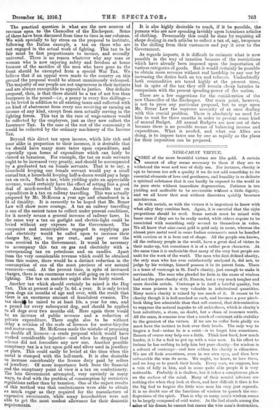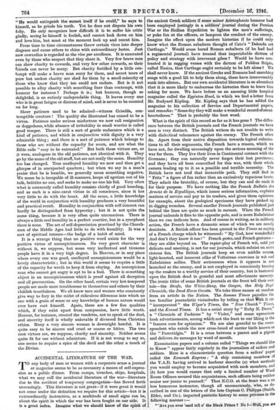NNE-CARAT VIRTUE.
SOME of the more beautiful virtues are like gold. A certain amount of alloy seems necessary to them if they are to withstand the wear and tear of daily use. For instance, charity is apt to become too soft a quality if we do not add something to its essential elements of love and gentleness, and humility is so delicate a spiritual substance that it can hardly be exposed to the world in its pure state without immediate degeneration. Patience in too yielding and malleable to be serviceable without a little dignity, and we all know that zeal without discretion quickly beoomea mischievous.
As with metals, so with the virtues it is important to know with what alloy they combine best.. Again, it is essential that the right proportions should be used. Some metals must be mixed with baser ones if they are to be really useful, while others require to be associated with something only second to themselves in value. We all know- that nine-carat gold is gold only in name, whereas the almost pure metal used in some Indian ornaments must be hmulled with caution or it is bent out of shape. All the people one knows, all the ordinary people in the world, have a great deal of virtue in their make-up, but sometimes it, is of a rather poor character. At the same time it is undeniable that many of the very best people are unfit for the work of the world. The man who first defined charity, the only man who has ever satisfactorily analysed it„ did not, to judge by his writings, himself possess it in its purest form. There is a trace of contempt in St. Paul's charity, just enough to make it serviceable. The man who pleaded for fools in the name of wisdom had not the pure charity of St. Francis, but a very much tougher and more durable article. Contempt is in itself a hateful quality, but like some poisons it is very valuable in infinitesimal quantities. Many men's charity is ruined by too much of it. It ceased to be charity though it is hall-marked as such, and beeomes a poor pinch- beck thing less admirable than that self-control, that determination , to suppress the natural impulse to all unkindness, which is charity's best substitute, a sham, no doubt, but a sham of immense worth. All the same, it remains true that a touch of contempt adds stability to the greatest of the virtues. If we are to suffer fools gladly we must have the instinct to look over their heads. The only way to forgive a fool—unless he is a saint—is to forget him sometimes. Reason of course may help one a little. Think how hard, how much harder, it is for a fool to put up with a wise man. In his effort to forbear he has nothing to help him but pure charity—for wisdom is a solvent of contempt—and how seldom his charity is efficacious. We are all fools sometimes, even in our own eyes, and then how unbearable the wise do seem. We ought, we know, to love them, and we long so to punch their heads. Every man, we suppose, has. a vein of folly in him, and in some quite able people it is very noticeable. Probably it is shallow, but it takes a conspicuous place on the surface of the mind. Many of their mental inferiors see nothing else when they look at them, and how difficult it then is for the big fool to forgive the little wise man his very just reproofs. It is no doubt one of the functions of wisdom to quench the con- flagrations of the spirit. That is why so many men's wisdom seems to be largely composed of cold water. As the fool stands among the ashes of his dream he cannot but resent the wise man's destruction.
"He would extinguish the sunset itself if" he oonld," he says to himself, as he grinds his teeth. Yet he does not dispute his own folly. He only recognizes how difficult it is to suffer his critic gladly, seeing he himself is foolish, and cannot look down on him and love him, but must at the moment look up and resent him.
From time to time circumstances throw certain vices into deeper disgrace and cause others to shine with extraordinary lustre. Just now cowardice is regarded as the vice par excellence. It is execrated even by those who suspect that they share it. Very few brave men can show charity to cowards, and very few other cowards, so their friends can never be many. But charity fortified by a little con- tempt will make a brave man sorry for them, and secret tears of pure but useless charity are shed for them by a small minority of those who know that they too could not endure. But is it not possible to alloy charity with something finer than contempt, with humour for instance ? Perhaps it is ; but humour, though so delightful, is an entirely undependable thing. It leaves every one who is in great fatigue or distress of mind, and is never to be counted on for long.
Sheer patience used to be admired—witness Griselda, con- temptible creature ) The quality she illustrated has ceased to be a virtue. Patience under serious misfortune we now call resignation or doggedness, while absence of irritability in small worries is called good temper. There is still a sort of gentle endurance which is a kind of patience, and which in conjunction with dignity is a very admirable thing ; and there is a sort of patience which belongs to those who are without the capacity for scorn, and are what the Bible calls " easy to be entreated." But both these virtues are, as it were, analogous to the old patience, not identical with it. They go by the name of the old stuff, but are not really the same. Humility too has changed. True unalloyed humility we now and then get a glimpse of in unexpected quarters ; but when we say in a man's praise that he is humble, we generally mean something negative. We mean he is incapable of ill-manners, keeps all egotism out of his talk, belittles no one, and seeks to make no one his foil. Very often what is commonly called humility consists chiefly of good breeding, and as such is a nine-carat virtue in all conscience, since it has very little to do with the heart. All the same, a little knowledge of the world in conjunction with humility produces a very beautiful and practical result. Humility in conjunction with self-interest can hardly be distinguished from hypocrisy ; but it is not quite the same thing, because it is very often quite unconscious. There is always a little real humility in a perfect courtier, but in a sycophant there is none. The art of self-depreciation practised by the Church- men of the Middle Ages had little to do with humility. It was a sort of spiritual tonsure—the badge of a habit of mind.
It is a strange thing that no positive word exists for the very positive virtue of unsuspiciousness. No very great character is without it, we suppose, but some very ineffectual and tiresome people have it in a very high degree. In Heaven, or in any place where every one was good, unalloyed unsuspiciousness would be a lovely characteristic ; but in this world it seems to require a little of the capacity for wrath to keep it from cloying. An unsuspicious man who cannot get angry is apt to be a fool There is something abject in an unsuspiciousness which is proof against all deception and all provocation. On the other hand, certain very hot-tempered people are made more troublesome to themselves and others by their childish trustfulness. We all know men and women who constantly give way to fury in the midst of ridiculous dilemmas into which no one with a grain of sense' or any knowledge of human natare would ever have cast himself. Again, there are a few fine qualities which, if they exist apart from compassion, have little worth. Honour, for instance, created the vendetta, not to speak of the duel, and sincerity itself is wholly unlovable if divorced from Christian ethics. Many a very sincere woman is downright hateful. It is quite easy to be sincere and cruel or coarse or bitter. The two root virtues are, we suppose, charity and sincerity. Neither seems quite fit for use without admixture. If it is not wrong to say so, one seems to require a spice of the devil and the other a touch of the Divine.



































 Previous page
Previous page